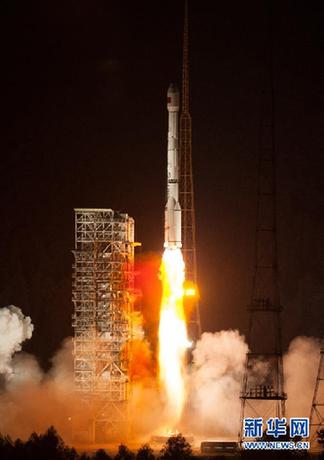
China launches another satellite for independent navigation system
Xinhua, October 26, 2012
-
China successfully launched another satellite into space for its indigenous global navigation and positioning network at 11:33 p.m. Beijing Time Thursday, the launch center said.

China successfully launched another satellite into space for its indigenous global navigation and positioning network at 11:33 p.m. Beijing Time on October 25, 2012.
The satellite, launched from the Xichang Satellite Launch Center in the southwestern province of Sichuan, was boosted by a Long March-3C carrier rocket.
It was the 16th satellite for the Beidou system, or Compass system.
The network is planned to officially provide services for most parts of the Asia-Pacific region in early 2013 and begin offering global services by 2020.
Since it started to provide services on a trial basis on Dec. 27, 2011, the Beidou system has been stable, said a spokesperson of the China Satellite Navigation Office.
The system has been gradually used in extended sectors including transportation, weather forecasting, marine fisheries, forestry, telecommunications, hydrological monitoring and mapping, according to the spokesperson.
The newly-launched satellite will play an important role in improving the system's service, the spokesperson said.
China started to build up its own satellite navigation system to break its dependence on the U.S. Global Positioning System in 2000.
Between October 2000 and May 2003, the country set up a regional satellite navigation system after launching three Beidou geostationary satellites.
Beidou-1 can not meet growing demand, so China decided to set up a more functional Beidou-2 regional and global navigation system, Qi Faren, former chief designer for Shenzhou spaceships, said in an interview in 2011.
The Beidou-2 system will eventually consist of 35 satellites.
Five Beidou satellites were sent into space early this year. The 11th satellite was boosted by a Long March-3C carrier rocket on Feb. 25, the 12th and 13th were sent by a Long March-3B carrier on April 30, while the 14th and 15th satellites were launched on Sept. 19.